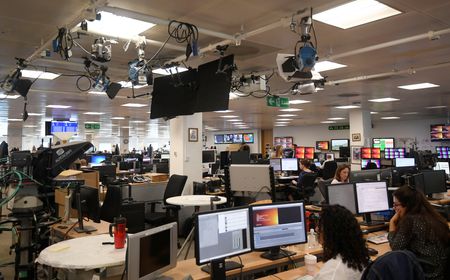By Kenneth Li
(Reuters) -Thomson Reuters on Thursday forecast a pickup in underlying revenue growth over this year and next as it continues to invest in AI-driven products for its legal, accounting and other professional customers.
The Toronto-based content and technology company said it expects organic revenue, which strips out the impact of currency moves, acquisitions and asset sales, to rise by 7% to 7.5% in 2025 and 7.5% to 8% in 2026. The growth rate was 7% in 2024.
The forecasts came as the company reported a 5% increase in revenue for the fourth quarter of 2024 to $1.909 billion, slightly ahead of analyst expectations of $1.907 billion, according to LSEG data. Adjusted earnings per share of $1.01 beat Wall Street’s expectation of 96 cents per share.
At 1445 GMT, Thomson Reuters shares were up 6.7% to C$253.4 on the Toronto Stock Exchange and up 4.8% to $177.29 on the New York Stock Exchange.
“2024 marked important progress at Thomson Reuters,” said CEO Steve Hasker in a prepared statement. “Looking ahead to 2025, we continue to focus on investing in content-driven technology that helps professionals make complex decisions with confidence.”
Thomson Reuters, which owns the Westlaw legal database, Reuters news agency and the Checkpoint tax and accounting service, spent more than $200 million on AI investments in 2024 and expects to continue at that pace in 2025, executives said.
Overall, the company has said it has about $10 billion to spend on potential acquisitions through 2027.
Heavy spending on AI and infrastructure investments by big technology companies has come under scrutiny this year after the surprise launch of China’s DeepSeek AI, which was purported to have been developed at a fraction of the cost of models from industry leaders OpenAI, backed by Microsoft, and Alphabet’s Google..
The low cost, and performance that is on par with some of OpenAI and Meta’s most advanced models, has attracted the attention of enterprise customers in the U.S. and sent major AI stocks like AI chip maker Nvidia plunging in late January.
Its ownership by a Chinese company has also raised alarm among governments and institutions. Italy has banned DeepSeek over concerns about its data collection practices. Taiwan, Australia and South Korea have banned its use on government devices. U.S. lawmakers are also pushing for such a ban.
Thomson Reuters said it was currently testing DeepSeek in a separate and secure environment.
Its fourth-quarter operating profit rose 29% to $722 million, boosted by the sale of FindLaw.
The company raised its annualized dividend per share by 10%.
In the fourth quarter, Thomson Reuters said it acquired Materia, a startup that develops AI agents for the tax and accounting sector.
In the first quarter of this year, it purchased cPaperless, LLC, owner of SafeSend, a provider of technology for tax and accounting businesses, for $600 million in cash.
(Reporting by Kenneth Li in New York. Editing by Mark Potter)







